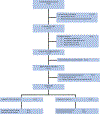Streamlined Genetic Education and Cascade Testing in Men from Hereditary Breast Ovarian Cancer Families: A Randomized Trial
- PMID: 39173603
- PMCID: PMC11407795
- DOI: 10.1159/000540466
Streamlined Genetic Education and Cascade Testing in Men from Hereditary Breast Ovarian Cancer Families: A Randomized Trial
Abstract
Introduction: When a pathogenic BRCA1 or BRCA2 mutation is identified in a family, cascade genetic testing of family members is recommended since the results may inform screening or treatment decisions in men and women. However, rates of cascade testing are low, and men are considerably less likely than women to pursue cascade testing. To facilitate cascade testing in men, we designed a Web-based genetic education tool that addressed barriers to cascade testing, was individually tailored, delivered proactively, and could be used in lieu of pretest genetic counseling to streamline the cascade testing process.
Methods: We randomized 63 untested men from hereditary cancer families to Web-based genetic education (WGE) versus enhanced usual care (EUC). WGE participants were provided access to a genetic education website after which they could accept or decline genetic testing or opt for pretest genetic counseling. EUC participants received an informational brochure and a letter informing them of their eligibility for genetic testing and recommending they schedule genetic counseling. The primary outcome was the uptake of genetic testing.
Results: Men in the WGE group were more likely to complete genetic counseling and/or genetic testing (43% vs. 12.1%; χ2 [n = 63, df = 1] = 7.77, p = 0.005). WGE participants were also more likely to complete genetic testing compared to men in the EUC group (30% vs. 9.1%; χ2 [n = 63, df = 1] = 4.46, p = 0.03).
Conclusion: This preliminary trial suggests that a streamlined approach to genetic testing using proactively delivered genetic education may reduce barriers to cascade testing for at-risk men, leading to increased uptake. These results should be interpreted cautiously given the select sample and high rate of non-response.
Trial registration: ClinicalTrials.gov NCT02957981.
Keywords: BRCA1; BRCA2; Cascade testing; Genetic counseling; Genetic testing; Prostate cancer risk; Traceback testing.
© 2024 The Author(s). Published by S. Karger AG, Basel.
Conflict of interest statement
Conflict of Interest Statement
Ms. Peshkin is a paid consultant for Clear Genetics, San Francisco, CA. Dr. Isaacs has received consulting fees from Pfizer and Astra Zeneca. Ms. Ladd, Ms. Segal, Ms. Jacobs, Ms. Sorgen, Ms. Binion, Ms. Tynan, Ms. Kuchinsky, Mr. Grisham, Mr. Kim, and Drs. Taylor, Graves, O’Neill, Friedman, and Schwartz declare that they have no conflict of interest.
Figures
References
-
- Rosenthal ET, Bernhisel R, Brown K, Kidd J, Manley S. Clinical testing with a panel of 25 genes associated with increased cancer risk results in a significant increase in clinically significant findings across a broad range of cancer histories. Cancer Genet. 2017. Dec;218–219:58–68. - PubMed
-
- Bellcross CA. Hereditary Breast and Ovarian Cancer: An Updated Primer for OB/GYNs. Obstet Gynecol Clin North Am. 2022. Mar;49(1):117–47. - PubMed
-
- Petrucelli N, Daly MB, Pal T. BRCA1- and BRCA2-Associated Hereditary Breast and Ovarian Cancer. In: Adam MP, Mirzaa GM, Pagon RA, Wallace SE, Bean LJ, Gripp KW, et al. , editors. GeneReviews® [Internet]. Seattle (WA): University of Washington, Seattle; 2022. [cited 2023 Apr 27]. Available from: http://www.ncbi.nlm.nih.gov/books/NBK1247/ - PubMed
-
- Kuchenbaecker KB, Hopper JL, Barnes DR, Phillips KA, Mooij TM, Roos-Blom MJ, et al. Risks of Breast, Ovarian, and Contralateral Breast Cancer for BRCA1 and BRCA2 Mutation Carriers. JAMA. 2017. Jun 20;317(23):2402–16. - PubMed
-
- Dean M, Rauscher E, Gomez E, Fischer C. Expectations versus reality: The impact of men’s expectancy violations in conversations with healthcare providers about BRCA-related cancer risks. Patient Educ Couns. 2019. Sep;102(9):1650–5. - PubMed
Publication types
MeSH terms
Substances
Associated data
Grants and funding
LinkOut - more resources
Full Text Sources
Medical
Miscellaneous



